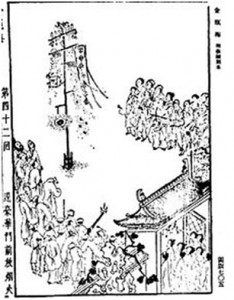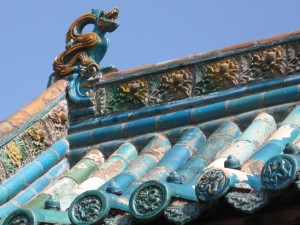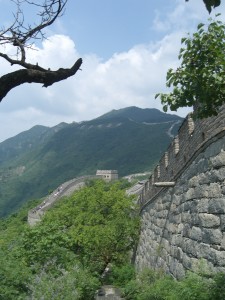An illustration of a fireworks display from the 1628–1643 edition of the Ming Dynasty novel Jin Ping Mei
爆竹 bàozhú, baoh-zhru firecracker [or literally exploding bamboo]
The history of marvelous Chinese inventions is fascinating. The invention of firecrackers is an example.
The word for firecracker in Chinese is bàozhú (exploding bamboo) and is derived from the original firecrackers used in ancient China, perhaps as far back as the Han Dynasty (206-220 BC). At that time, pieces of green bamboo were thrown into a fire and then the bamboo would burst apart with loud bangs. In other words, these original firecrackers were not the same as those developed later, no gunpowder was included.
Li Tian, a monk living near Liu Yang city, Hunan province, is credited with having invented the modern firecracker. According to mythology, Li Tian filled a piece of bamboo with gunpowder to frighten away a persistent ghost that had been bothering the Tang Dynasty (618-907 AD) emperor Li Shi-ming. The loud bang did the job. The ghost fled and the emperor once again had peace. In honor of this great invention (pyrotechnic fireworks), Chinese traditionally held a festival in Li Tian’s honor on April 18th.
By the end of the Northern Song Dynasty (960–1127 AD), firecrackers consisted of paper tubes stuffed with gunpowder. The tubes were tied together with rope, forming a long string of firecrackers, which could be set off in succession. This produced quite a display of noise and smoke.
Noise and smoke, both are considered important for protecting a household. Noise chases away ghosts and other evils, such as poisonous insects (see my January 5, 2014 blog on the 5 noxious animals also sometimes called the five evils) and sickness. Smoke cleanses the house and also gets rid of poisonous insects and dampness, which can cause illness. Therefore, for a couple of thousand years firecrackers have been synonymous with health and peace, which leads to a prosperous future for the family.
Sources for fireworks: Joseph Needham Clerks and Craftsmen in China and the West 1970 p. 89-90; http://kaleidoscope.cultural-china.com/en/10Kaleidoscope8486.html; www.kracklinkirks.com/fireworks%20history.htm;
Illustration: “Ming Dynasty Jin Ping Mei fireworks” by Unknown – Jin Ping Mei, from Science and Civilisation in China p. 140. Licensed under Public Domain via Wikimedia Commons – http://commons.wikimedia.org/wiki/File:Ming_Dynasty_Jin_Ping_Mei_fireworks.jpg#mediaviewer/File:Ming_Dynasty_Jin_Ping_Mei_fireworks.jpg.
[pinterest]


